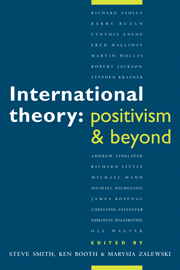Book contents
- Frontmatter
- Contents
- List of contributors
- Preface and acknowledgements
- Introduction
- I Debates
- II Legacies
- III Silences
- 7 The rise and fall of the inter-paradigm debate
- 8 Margins, silences and bottom rungs: how to overcome the underestimation of power in the study of international relations
- 9 Is there a classical international theory?
- IV Openings
- V Directions
- Index
9 - Is there a classical international theory?
Published online by Cambridge University Press: 09 March 2010
- Frontmatter
- Contents
- List of contributors
- Preface and acknowledgements
- Introduction
- I Debates
- II Legacies
- III Silences
- 7 The rise and fall of the inter-paradigm debate
- 8 Margins, silences and bottom rungs: how to overcome the underestimation of power in the study of international relations
- 9 Is there a classical international theory?
- IV Openings
- V Directions
- Index
Summary
Martin Wight on international theory
In the 1960s Martin Wight (1966) provocatively argued that there is no international political theory worthy of the name – if we compare it to domestic political theory which is a foundational subject of longstanding. Very few classical theorists devoted their talents and energies to international relations and those who did – such as Kant or Machiavelli or Burke – are not famous for that part of their contribution. There is no classical masterpiece of international political theory except, perhaps, Thucydides' history of the Peloponnesian war (Warner, 1972). International relations is ‘at the margin’ of the greatest political theorists' curiosity or concern.
By ‘political theory’ Wight is of course not referring to ‘scientific’ or positivist theory of politics, which he considered to be a deeply flawed enterprise resting on an erroneous conception of human beings and their relations. Nor is he referring to anti-foundational theory, such as the theories of certain continental European philosophers of his day, to which I have found no reference in his published writings. Nor, again, is Wight referring exclusively to academic theories. He would see departments of international relations as merely the current home of theorising about international relations most of which has been carried out historically in other places, such as monasteries, foreign embassies, chancery offices, military quarters, prisons, the studies of private scholars and other such places. Theoretical reflection on the political world beyond one's own community is as old as the Western intellectual tradition. The academic study of the subject is merely an innovation of the twentieth century.
- Type
- Chapter
- Information
- International TheoryPositivism and Beyond, pp. 203 - 218Publisher: Cambridge University PressPrint publication year: 1996
- 12
- Cited by



